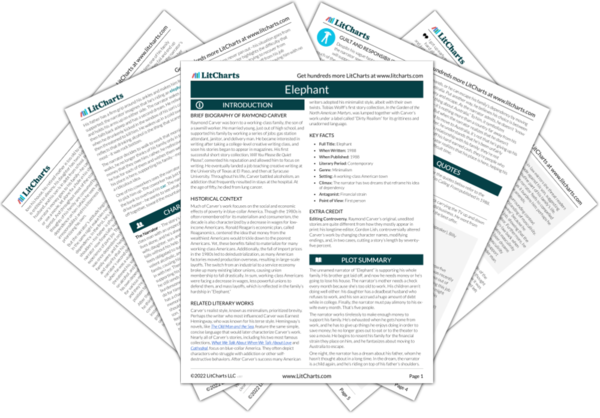The narrator and his family are working-class people, and it’s a difficult life. Though the narrator never mentions where he works, he works hard all day, returns home, and doesn’t even have the energy to watch television or take off his shoes. Similarly, the narrator’s daughter gets a job at a salmon cannery. She insists that she’s “young and strong” and plans to work twelve to fourteen hours a day, seven days a week. This could be an exaggeration designed to manipulate the narrator into writing more checks, but this family unmistakably represents blue-collar America: people who earn money through hard manual labor.
When the narrator and his family fall on hard times, it becomes clear that there isn’t a good path out of financial instability for people of their economic class. Each time one of his family members tries to get back on their feet, they fail and end up relying on the narrator for another check. While the narrator’s daughter is working at the cannery, burglars break into her house and steal all her furniture. His son goes to college, and though education is an oft-touted method of breaking into the middle class, he accrues a mountain of debt before graduation. Every step forward results in two steps backward—and more debt.
In a way, the family’s dependence on the narrator is an indictment of the American system—his mother should be able to live in retirement without depending on her son, his brother shouldn’t have his life ruined because his company downsized leaving him unable to pay his mortgage, his son should be able to go to college without being crushed by debt, and his daughter should have childcare so she can work. But American capitalism doesn’t provide those resources, so the narrator himself is forced to keep his family from destitution, which he himself can’t even afford.
Money and Hardship ThemeTracker

Money and Hardship Quotes in Elephant
He told me he’d hurt his back carrying the TV up and down the street where the pawnshops did business. He went from place to place, he said, trying to get the best offer.
But he was the first kid in the family, on either side of the family, to even want to go to college, so everybody thought it was a good idea. I thought so, too, at first. How’d I know it was going to wind up costing me an arm and a leg? He borrowed left and right from the banks to keep himself going. […]But after he'd borrowed everything he could, everything in sight, including enough to finance a junior year in Germany, I had to begin sending him money, and a lot of it. When, finally, I said I couldn’t send any more, he wrote back and said if that was the case, if that was really the way I felt, he was going to deal drugs or else rob a bank—whatever he had to do to get money to live on.
That’d be the big thing. It was going to require a special kind of sitter, seeing as how the hours would be long and the kids were hyper to begin with, because of all the Popsicles and Tootsie Rolls, M&M’s, and the like that they put away every day.
Everything in the trailer. Every stick of furniture was gone when she came home from work after her first night at the cannery. There wasn’t even a chair left for her to sit down on.











